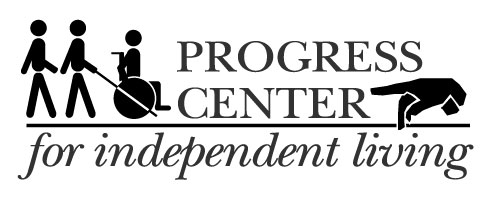The 2020 Census and the Disability Community
The 2020 Census and the Disability Community
Above Photo: Two friends smiling together in a parking lot. The young man driving is disabled. Photo credit: Kali9. Photo from Getty Images The Disability Collection
This year, 2020, is a Census year in the United States. The Census is a count of how many people live in the United States. An accurate Census is important because Census Data helps to determine the number of elected officials in a particular state and the level of Federal Funding for a community. If a state or a community is under-counted, then that area may not receive the representation or the funding that it deserves.
A new Census is taken every ten years. The last Census in the United States was in 2010. Across Cook County and Illinois, groups are creating what are called Complete Count Committees. The committees develop strategies that will support an accurate count. At Progress Center, our goal is to ensure that people with disabilities in Suburban Cook County are aware of the Census, have accurate information about the Census process, and can access the Census and can participate in the process.
To meet this goal, Progress Center will:
- Participate in Census Complete Count Committees — At this time, we are members of two Complete Count Committees. One committee is specific to disability. That committee includes representatives from disability groups around Cook County. The second committee is specific to River Forest, Illinois, a community in the Progress Center service area.
- Conduct focused outreach to the disability community in the Forest Park area, informing people about the Census and what to expect. If you have questions about the Census, please contact Progress Center.
- Be a resource for people with disabilities who have questions about the Census
Also on this web page, Progress Center will post links to Census resources, and will post information about upcoming Census events.
- Frequently Asked Questions about the Census
The FAQ below is taken from the Village of River Forest Census Page. The page can be accessed at this link:
https://vrf.us/guides/guide/29?fbclid=IwAR2uA40h90jvEDhG9zKgn7ziqqAYcAVbXqN1YG-fKKOWUhLnyoblnBtH37k
Why does it matter?
Participating in the 2020 Census is a civic duty. An accurate census ensures fair representation on all levels of government, and Census data is used to determine the allocation of more than $800 billion in federal funds annually to states, counties and cities across the country. Census data is also used for research, and academic institutions, medical facilities, and businesses all utilize census data for a variety of purposes.
When should I start thinking about the Census?
Self-response begins in March 2020, when the Census Bureau sends out a postcard which includes an invitation to respond online and an optional paper questionnaire. For those who receive a postcard and fail to respond, Bureau employees will conduct non-response follow ups. These in person visits begin in May 2020 and last through July. Read the US Census Bureau’s fact sheet, How the 2020 Census will invite everyone to respond.
What’s new for 2020?
The 2020 Census will be the first to let citizens provides responses over the phone or through an online portal.
Will my information be protected?
Census Bureau employees are sworn to uphold the confidentiality of your data for life. Your responses can only be used to produce statistical information, and your personal information cannot be seen or used by other government agencies or the courts. Read the US Census Bureau’s fact sheet, The 2020 Census and Confidentiality.
2. The Census and the Disability Community
The information below is taken from a Disability Tool Kit created by Disability Rights California. This is a link to the full tool kit –https://www.disabilityrightsca.org/post/2020-census-disability-community-toolkit
From Disability Rights California:
Why the Census Is Important to the Disability Community
The United States Constitution requires the census to ensure fair political representation. Community leaders and elected officials rely on accurate census data to make funding decisions about education, senior citizen and veteran supports, and other community allocations. It is important to get the numbers right, everyone—including people with disabilities—must be counted.
While the United States census only comes around once every 10 years, census data play a vital role in the lives of people with disabilities every day.
As we stated at the beginning, according to the CDC, people with disabilities make up 22% of the US population, nearly 1 in 4 (https://www.cdc.gov/ncbddd/disabilityandhealth/infographic-disability-impacts-all.html).
The decennial census, not CDC estimates, determines allocations for real-life necessities, like health care, Supplemental Nutrition Assistance Program (SNAP), special education grants and Medicaid.
Medicaid, State Children’s Health Insurance Program (S-CHIP), Head Start and Early Head Start, highway planning and construction, and our nation’s foster care programs are among the top 16 largest federal programs whose funding—totaling nearly $600 billion a year—depend on census data.
Special education grants provide resources to disabled students, tailored to their individual needs. If the U.S. Census Bureau does not conduct a full and accurate count, administrators of special education programs will have no way of knowing how many children they must teach, which school districts need more educators, or what communities need more schools.
Census figures help advocates, community leaders, and elected officials address disparities in housing, health care, employment, and education. Fair proportionate voting representation depends on valid census data, as does the enforcement of voting rights laws. The health and well being, and the political power of all communities, rests on a fair and accurate census count. Elected officials cannot make informed decisions about how to allocate federal tax dollars fairly and effectively without an accurate accounting of the population.
As such, an accurate census count is essential in ensuring people with disabilities who need these necessary supports and services participate in the census.
3. Census Resources
- United States Census Website — https://2020census.gov/
- River Forest Census 2020 Webpage — https://vrf.us/guides/guide/29?fbclid=IwAR2uA40h90jvEDhG9zKgn7ziqqAYcAVbXqN1YG-fKKOWUhLnyoblnBtH37k
- Census 101 Flyer and Fact Sheet —2020-Census-Flyers – 2019-09-06
- Disability Rights California Census Tool Kit
- From the Arc of Massachusetts — Webinar– January 23, 2020: Why the 2020 Census Matters for People with Disabilities
- Link to Census Information on the JJ’s list Blog
For more information, please contact Progress Center at garnold@progresscil.org


